| Reviews & Columns |
|
Reviews DVD TV on DVD Blu-ray 4K UHD International DVDs In Theaters Reviews by Studio Video Games Features Collector Series DVDs Easter Egg Database Interviews DVD Talk Radio Feature Articles Columns Anime Talk DVD Savant Horror DVDs The M.O.D. Squad Art House HD Talk Silent DVD
|
DVD Talk Forum |
|
|
| Resources |
|
DVD Price Search Customer Service #'s RCE Info Links |
|
Columns
|
|
|
Help Me My Love (Amore mio aiutami, 1969, Sony Choice Collection)
"The affair with that other man is definitely over."
"How did this miracle happen?"
"Plenty of blows, three broken ribs, four dislocated joints, twisting of the spinal column."
"Anything else?"
"One black eye."
"And now?"
"Now she's completely cured! Look how she smiles!"
Sometimes amusing, increasingly exasperating Commedia all'italiana, fatally wounded by repetition and over-length. Sony Picture's valuable Choice Collection line of hard-to-find cult, foreign, and library titles has released Help Me My Love (original Italian title: Amore mio aiutami), the 1969 comedy drama released here in the States by Columbia in 1970. Starring Alberto Sordi (who also directed and co-scripted), Monica Vitti, Silvano Tranquilli, Guo Gregoretti, and Laura Adani, Help Me My Love's comedy set-up--a "modern," free-thinking husband can't handle his wife's infatuation with another man--is certainly ripe with possibilities for not only straight laughs but also social commentary on Italy's changing society in the late 1960s. However, running just over two hours, Help Me, My Love beats the barest bones of its few ideas into the ground, over and over and over again, until we finally cry, "Zio!" Presented here in its original Italian soundtrack with English subtitles, there are no extras for this nice-looking anamorphically enhanced widescreen transfer.
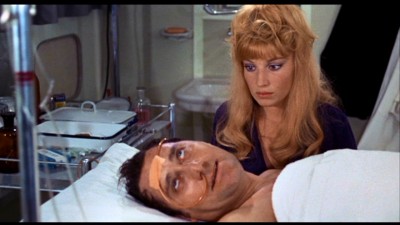
Rome, 1969. Wealthy banker Giovanni Macchiavelli (Alberto Sordi), awakened by his gorgeous wife, Raffalla (Monica Vitti), is looking forward to a day at the coast, where his present to her--a fabulous beach house--is nearing completion. Raffalla, afflicted with a psychosomatic nervous condition that renders her arms and/or legs useless when she's anxious or stressed, reads the newspaper to her husband, who wants to hear more about the story of a professional man who shot his wife dead for taking a walk with her supposed lover. Discussing the crime during the car ride to the sea, Giovanni insists he's the kind of new "democratic, free-thinking" modern Italian husband who would rationally allow his cheating wife to play out any minor indiscretions she may have, as long as they discussed everything openly--measured rationality is everything to him, and he hates hypocrisy and deceit. Raffalla doesn't agree at first, believing a marriage, as a romantic and societal contract, should never be discussed between partners...but finally, at the beach house, emboldened by Giovanni's previous assertions, she lays a bombshell on him: she has fallen for another man. Accompanied by her mother, Elena (Laura Adani), Raffaella has been attending classical concerts each Wednesday solely to meet nuclear physicist Valerio Mantovani (Silvano Tranquilli). She assures Giovanni that Professor Mantovani knows nothing of her feelings, but "modern husband" Giovanni immediately hits the roof. Controlling himself after Raffaella's pleas that she still loves him, Giovanni, once home, can't believe that Raffaella not only still insists on seeing Mantovani at the concerts, but that she still loves the physicist. What follows is a seemingly endless battle for Giovanni to control his sanity while Raffaella tries to have her cake and eat it, too.
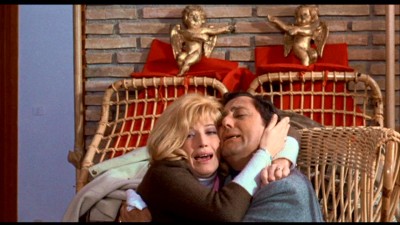
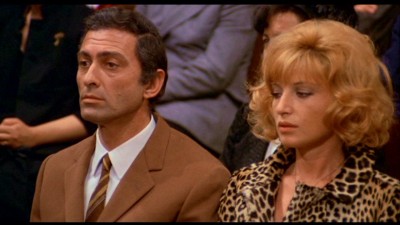
As I wrote in my review of Made in Italy, I'm certainly no expert in the Commedia all'italiana "genre." Apparently it's a loose term anyway, according to more knowledgeable writers, with a central distinguishing feature of the genre being an emphasis on delivering an equally sad, resigned tone along with the laughs, while satirizing and sympathizing with its Italian characters. My exposure to the genre is limited to just a handful of titles that are readily known here in the States, such as Big Deal on Madonna Street, Divorce, Italian Style, Boccaccio '70, Yesterday, Today and Tomorrow, The Witches, The Seduction of Mimi, Swept Away, Made in Italy, and a few others. And just like Made in Italy, it's difficult for me to put Help Me, My Love into context, not only in conjunction with other Commedia all'italiana, but also with Italian society at that time. I can watch a Doris Day comedy from 1967, and know what was exaggerated and what was close to reality in American life at that time, while putting the movie in perspective with other comedies coming out that same year, say...Caprice compared to The Graduate or Divorce, American Style. With Help Me My Love, though, it's all guesswork, with innumerable Italians societal/cinematic subtleties no doubt lost to me. Going to the web, there's almost no detailed information on Help Me My Love on any English language movie sites, but what I could glean from several Italian ones, courtesy of some very shaky Google translations, is that Help Me My Love doesn't have a very stellar rep overall, except for one scene now considered a "classic" in the Commedia all'italiana genre--and certainly the one that will most disturb viewers today--where Sordi almost beats Vitti to death on a beach...for laughs (more about that below).
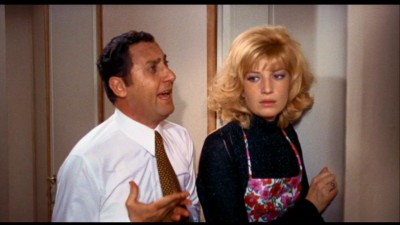
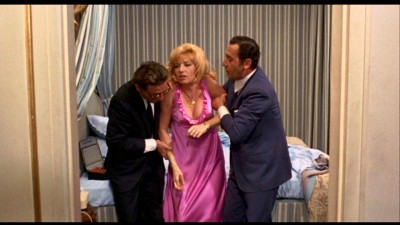
Putting aside worries about cultural subtleties, what isn't difficult to discover concerning Help Me My Love's poor reputation among aficionados of the genre, will be apparent to anyone with even a basic background in screen comedy: it's way, way too long. Certainly there are other problems with this comedy drama, including a slight, familiar script and some questionable characterizations; however, the overlength of the piece magnifies these issues tenfold, and eventually smothers the few pleasures a viewer can find here. The initial setup--a "modern, democratic" husband battling his primitive urges to smash his emotionally cheating wife--seems to indicate we're going to enjoy a satire on the clash between traditional Italian male stereotypes and the changing Italian society of the late 1960s that encouraged a more open, free exchange of feelings between a married man and his wife. However, Help Me My Love's exploration of Sordi's personal dilemma never goes deeper than either slapstick physical gags (Sordi's wonderfully funny mugging and crying and whining; Vitti's numb legs and arm), or facile, overly-sentimental emotionalism (Sordi crying every five minutes over the genuine hurt and pain he feels for himself and his obviously suffering wife). These individual scenes work quite well. We're laughing when Sordi rolls his eyes and cries out at another impossible declaration of Vitti's love for another man, or when he's trying to walk around rubber-legged Vitti when she suffers yet another bout of love sickness for Tranquilli. And we feel something close to genuine melancholy when Sordi swallows his wounded pride and puts his wife's pain first, and again encourages her to contact Tranquilli (of course with the futile hope she'll finally give her lover up).
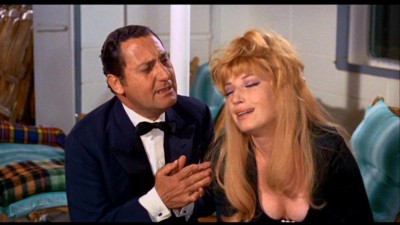
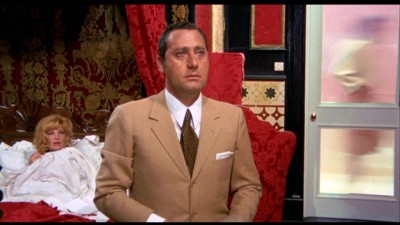
However, those dynamics are repeated endlessly here for over two hours, with the same two or three scenes of confession, outrage, sublimated anger, and then acquiescence, recycled over and over again past the point of caring. Once or twice or three times and we would have gotten Sordi's message, but eventually we discover Sordi's message is the repetition only--he just wants us to laugh and cry over this impossibility of a husband forgiving his emotionally (and eventually, physically) cheating wife, over and over again. This superficiality of purpose isn't exactly helped by the characterizations of all three leads. As the other man, Traquilli is off the screen most of the time, so we never understand why Vitti is attracted to him. That would have been fine, if Sordi was going for some commentary on Vitti throwing away her marriage for a fantasy lover who wasn't really "real." However, it's clear by the movie's end that Sordi merely uses Tranquilli as a comedic prop inbetween himself and Vitti, to propel the skimpy storyline, thereby inadvertently helping to rob meaning of Vitti's change of romantic allegiance. Vitti's character may be on screen most of the time, but she's "revealed" no more than Tranquilli, coming off as a grotesque caricature of alternately crying, mewling, dreamy female indecision, undeserving of any sympathy because she's never made human. If we don't understand her infatuation with Tranquilli, we don't care about her oversized agony over it, and we don't feel anything beneath the surface comedy effect of the pain and humiliation her betrayal causes Sordi.
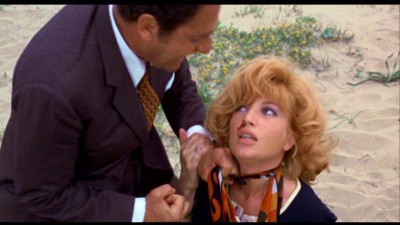
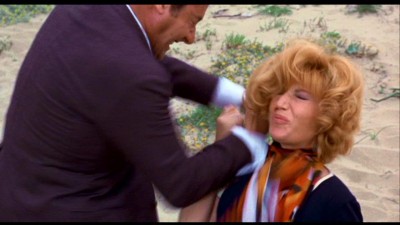
As for Sordi, he comes closest to having a reasonably motivated character, but again, the crushing repetition of his Giovanni's actions robs the character of our sympathy, particularly when the main "arc" to his character's development--his brief "return" to enraged, dominating Italian husband--is so repellant. In a scene that's wildly miscalculated, Soldi finally flips at yet another of Vitti's declarations of love for Tranquilli--complete with showing her body to passing motorists--balling up his fists and chasing her across the sand dunes, viciously punching her in the face and body repeatedly as he tries to make her say she doesn't love Tranquilli anymore. Her face realistically made-up to look like a pulpy mess, Vitti finally agrees she no longer loves Tranquilli when Sordi gets ready to deliver a death blow. Of course you could make a case that in American films there are all kinds of scenes of overt violence against women that are played for laughs; how many times have you seen that clip of Cary Grant violently grabbing Katherine Hepburn's face and shoving her down to the ground--her fall is off-camera to make it more "tasteful"--in The Philadelphia Story? However, the graphic violence of Help Me My Love's beach beating leaves the viewer stone cold towards Sordi's character, particularly when the movie makes it clear we're supposed to find it funny (the "pay off" for the scene are shots of Vitti bandaged up). If Sordi's point was to show up and criticize Giovanni's descent from rational, modern Italian married man to vicious batterer, it might have been a valid scene. However, we're treated to another hour of Sordi's cute mugging and crying, culminating SPOILER ALERT! in his supposedly noble sacrifice of letting his cruel, uncaring wife leave him for Tranquilli, as Sordi walks away from her, with tears in his eyes. None of this overly-sentimental, emotional finale is believable, not only because we don't like Sordi the batterer anymore (and we never liked or at least understood Vitti), but also because we've seen this all before. Many times.
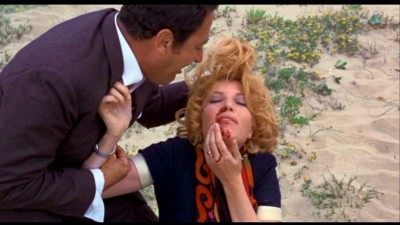
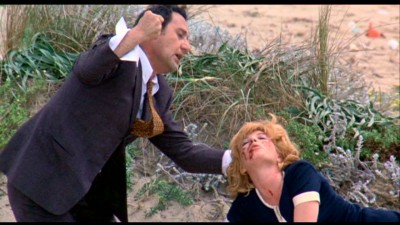
The DVD:
The Video:
The anamorphically-enhanced, 1.78:1 widescreen transfer for Help Me My Love looks a tad grainy in spots, but otherwise is reasonably clean, with okay color, a sharpish image, and maybe just a bit of smearing here and there in some of the darker scenes.
The Audio:
The Dolby Digital Italian mono audio track is just fine, with low hiss and a solid re-recording level. English subtitles are optional.
The Extras:
No extras for Help Me My Love.
Final Thoughts:
Superficial and repetitious, and ungodly long. In Help Me My Love, Sordi and Vitti are amusing to watch together as she wrings her hands over falling for another man, and he mugs and screams and cries. Amusing the first time. And then the second. And then maybe the third time. But after that, when this dynamic is repeated over and over and over again, we lose interest, compounded by a fatal two hour running time. A good idea that's underdeveloped in an overly long movie. A rental for Help Me My Love, I suppose, for fans of the stars, but only for those completists. Everyone else can skip it.
Paul Mavis is an internationally published movie and television historian, a member of the Online Film Critics Society, and the author of The Espionage Filmography.


|
| Popular Reviews |
| Sponsored Links |
|
|
| Sponsored Links |
|
|
| Release List | Reviews | Shop | Newsletter | Forum | DVD Giveaways | Blu-Ray | Advertise |
|
Copyright 2024 DVDTalk.com All Rights Reserved. Legal Info, Privacy Policy, Terms of Use,
Manage Preferences,
Your Privacy Choices | |||||||














